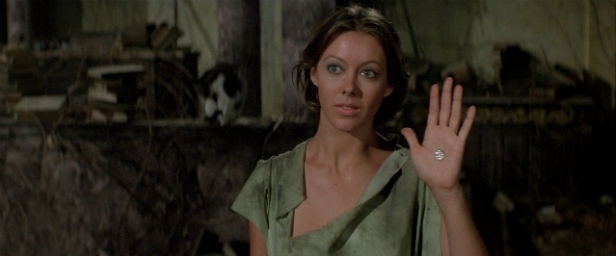
The great Jenny Agutter has starred in so many of our very favourite genre films, and now’s she’s auctioning off her personal script for one of the best: Michael Anderson’s 1976 classic Logan’s Run.
The star of An American Werewolf In London, Call The Midwife and Walkabout is raising money for the Cystic Fibrosis Trust with the Sixty-Five Roses auction, and is giving you the chance to bid on her original leatherbound screenplay for Logan’s Run. She was kind enough to take the time to talk to us about the charity, why she has such fond memories of the film, and what people on the bus recognise her from.
Could you tell us a bit about the auction?
First of all, the auction is for cystic fibrosis and it’s called Sixty-Five Roses. We call it Sixty-Five Roses auction because of a little child who, about 50 years ago, overheard his parents talking about his condition, couldn’t pronounce it; the closest he could get was Sixty-Five Roses. So his take on it was that he had Sixty-Five Roses. And his parents were kind of taken with the fact that this rather awful, life threatening condition that he had had been interpreted into something rather beautiful. So they stuck with that phrase and it was picked up then by the cystic fibrosis community essentially and it’s become a worldwide name that is named often when fundraising.
Cystic fibrosis is such a hard thing for people to understand anyway because it doesn’t actually tell you anything about a disease that affects affects the internal organs. Infections settle in and it makes it more and more difficult for people who have it to breathe, and as the lungs become very badly infected and they can’t throw off infections.
But it’s an exciting time because there’s so much research, so much new medication and all the rest of it, so I just thought the Logan’s Run script, with this life finishing at 30, there was a point in time where the median age of someone with CF was 30. That’s been moved along all the time. I have a niece who has CF, when she was born they said the median age was eight, when she got to 18 it was 30, she’s now 38. What one hopes is that medication just keeps with her like a wind behind, and keeping those people fit. But as I say the thing about Logan’s Run for me, was this was about life ending at 30, people fighting to be able to live longer, and here is a condition which is all about trying to live a full life. So it made sense.
Logan’s Run also is a film that, for me, is a terrific film to have done. I had a huge amount of fun doing it. Really lovely people on it, it was Michael Anderson who directed, and a man called Saul David who has now passed away who produced it, and it was him who produced this script for me. It’s the final script version, so it’s the script that I worked with, which was leather bound and they inserted all these photographs as well. So it’s been a little precious item I had around since 70 whenever it was, my goodness me it’s a long time ago! [laughs] They’ve talked again and again about, they did the TV series, they’ve talked again and again about making a film about making a film of it but I don’t think they’ve ever got round to it. I could always end up at some point in the Peter Ustinov part! They needn’t be sexist any longer; it could be a woman in the building!
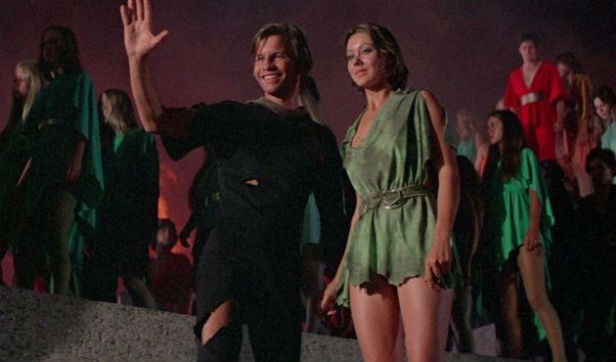
It’s definitely one of those films that has a conceit that hasn’t dated.
It’s funny because you say not dated, but when you look at it and you think that six months or so after that film came out, Star Wars was made and how very different that is in the style and the way it was made and the whole look and feeling of it was completely different. But Logan’s Run has a kind of classic, almost old movie style to it. I felt really that I was at the tail end of the Hollywood era, we worked in MGM studios and there was built up scaffolding and make-up had done all the make-up for the 40s stars, the lighting cameraman who belonged at MGM had done all the big movies. All of the crew and the people on the stages talked about Ethel Merman and various people before, and had wonderful stories about all the little cabins that one has as dressing rooms on these big old fashioned stages. One said “You know, they think they’re living their lives totally privately in these little cabins, but they forget there’s no roof on them!” So all the guys up the gantries could see straight down into the cabins!
They had all the big tanks and things we would use for scenes where we were going through some of the passages where water came in from outside. I do remember also filming one entire week at the Los Angeles Sewage Plant which wasn’t much fun! I spent a week running down corridors being wet down in that little green outfit, soaked each day, kept soaked and just would run shouting “Help!” and “No!” and “Logan!” And that was about it, that was my script for the week. But it was really good fun to do.
Not the least of which it was Michael Anderson. He just said, “These are all toys!” He kept saying, “It’s fun!” And it was. What was lovely about doing Joss Whedon’s Avengers Assemble, I played a little tiny role in that, it was lovely, he asked me to do it and I went out right at the beginning of filming and it just brought back that whole thing. It was big, these huge sets on large soundstages, huge production, lots of people running around painting sets and making things happen and special effects and all the rest of it. But Joss Whedon, he was having a good time, and I said “Are you enjoying this?” he said “Yep, this is really good fun” and it reminded me entirely of Michael Anderson and his attitude about this big thing. Joss Whedon did say at the end of it, because I went back for some filming at the very end, but he said it was really hard work, he forgot halfway through about the enjoyment! [laughs] It’s such a big process. The Captain America thing was also lovely to do.
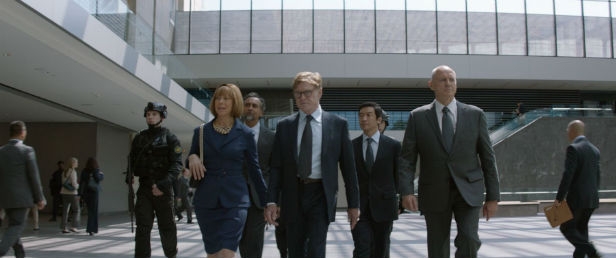
Did you ever think, when you were actually making the films, that they might go on to be classics?
I think always when you’re making a film it helps you to believe that maybe it will do well. The fact that something feels good when you’re making it translates onto screen, that energy is there. But sometimes you can have a great time and there’s all sorts of things that go wrong and it just doesn’t make it as a film, or doesn’t appeal to the audiences. It’s hard to tell what it is that works and why things go on and have their life afterwards. Science fiction is such a particular genre, when something becomes a cult with science fiction it just remains forever. I’m constantly coming up against people with little green outfits and sending pictures of the crystals and stuff. It stays with people’s imagination. If they’re sci-fi fans particularly, Logan’s Run has a place there. There’s so many, Brazil for me was an amazing sci-fi movie. I think because they enter the imagination in a particular way. It’s not just a story, it’s actually another world.
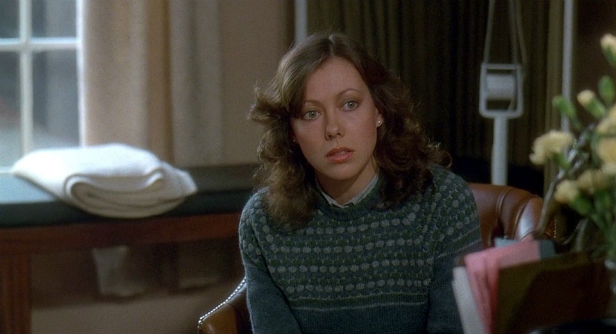
You’ve done several films that have stayed in people’s minds, like An American Werewolf In London.
That’s also, I think, because it was kind of a first. I met John and Deborah Landis when I first went to America, so well before we made American Werewolf, and he talked about it. He had written a script when he had been in Yugoslavia and working as a runner, and had been so taken with the fact that people had been that superstitious and had crosses on the side of the road, they still believed in werewolves and vampires. So he came up with the idea of the werewolf in London and found the English culture quite funny, which is why you’ve got all sorts, like the pubs and various things, which seen from an American point of view are quite amusing!
And the lovely thing about doing that film for me was that actually it was such a terrific script, the characters were very well formed. There are many horror movies where, particularly in that period of time, as a young woman you would end up running and screaming and that’s all that’s required. In this case it happened to be a really wonderful rounded character who’s this nurse who falls in love with a guy who turns out to be a werewolf. But I think there’s an awful lot of young women who’ve kind of been there. Not quite the werewolf but the person wasn’t quite what they expected! [laughs] And Landis has a way of working that is very high energy. You’re never really off the set, he likes people to be there, he shoots really quite fast, he will actually not stop and retake something but continue and just say “Do that again!” Really hard for the continuity people but he just wants to get something very immediate and I think he captures that, he’s very good as an actor to work with.
Do you find that you’re drawn to projects based on the people involved?
I think I do, I think I’m spoiled enough that if my agent says “Are you interested in meeting Werner Herzog,” I’ll go “Yes!” This industry is about working with other people. On the stage you may work with an audience and you can leave a lot behind. In a film it is in the hands of everybody else, it’s in the hands of the director, it’s in the hands of the editor and the cameraman and all those people.
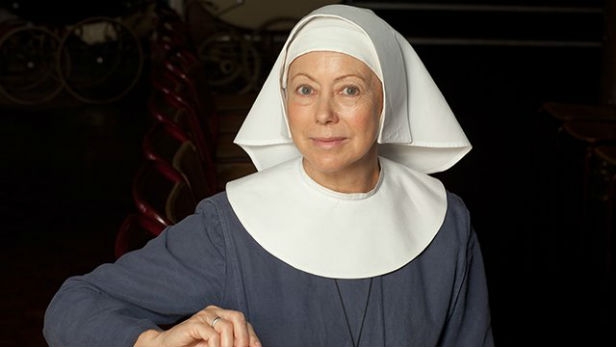
You’ve done a lot of things that I imagine people recognise you from, but in very different genres.
Yeah, it’s definitely different people for different things. A lot of taxi drivers have seen Walkabout and American Werewolf In London. Most people on the buses have seen The Railway Children! And on trains of course! And Call The Midwife is a really odd one today because I get approached by people, men, women, different age groups, different cultural backgrounds, different economic backgrounds, and they all find something that touches them. It might be something personal like “My aunt was a midwife” or “I was born in that era, my mum tells me such and such,” “I watch it because I like the 50s stories.” I think there’s something in the fact that belongs in a time that is close enough but different enough to go “Oh, it was difficult then.”
We’re actually now funnily enough going into the 60s, I’m doing the fifth series, it’s 1961, with all of the technological and artistic innovations and new music and fashion and everything beginning to emerge which had all been repressed during the war, plus we’ve got the NHS at its best and all the rest of it. But you’re beginning to understand how people want to leave the war behind, want to leave their difficulties behind, want to think about their future, and in doing so start to forget about their commitments in their own communities, which I think is where we have gone in many ways. We forget that it’s actually up to people. We complain very quickly about the things that go wrong. “The NHS is terrible,” or whatever. It’s fantastic but it’s up to people to make the changes to make it work. It’s not just up to those other people out there that do it. I think everybody needs to realise what they can contribute and the communities that they can contribute to.
The Sixty Five Roses charity auction can be found here. The auction ends at 8:00pm on 25 June, so get over there now!
